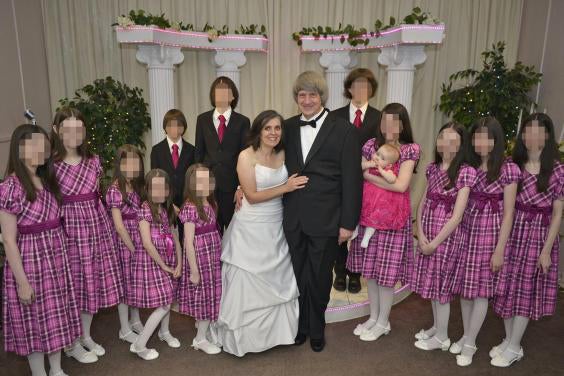Turpin family: Police may bring in dogs to search for bodies in house where children 'tortured' by parents, reports say
Thirteen children and adults were rescued from the house in California earlier this week
Your support helps us to tell the story
From reproductive rights to climate change to Big Tech, The Independent is on the ground when the story is developing. Whether it's investigating the financials of Elon Musk's pro-Trump PAC or producing our latest documentary, 'The A Word', which shines a light on the American women fighting for reproductive rights, we know how important it is to parse out the facts from the messaging.
At such a critical moment in US history, we need reporters on the ground. Your donation allows us to keep sending journalists to speak to both sides of the story.
The Independent is trusted by Americans across the entire political spectrum. And unlike many other quality news outlets, we choose not to lock Americans out of our reporting and analysis with paywalls. We believe quality journalism should be available to everyone, paid for by those who can afford it.
Your support makes all the difference.Detectives investigating the case of the 13 siblings found locked up in a house in California, may "send cadaver dogs" to see if there was anyone else in the house who may have died, reports have suggested.
Crime Watch Daily, a syndicated news show broadcast in multiple states across America, also reported that investigators were considering carrying out DNA tests on the Turpin children to check if they were all related, citing sources close to the case.
The Sheriff’s Department in Riverside County and the police department in the City of Perris, California did not respond to The Independent’s requests for comment on the alleged plans.
They did not confirm the allegations to Crime Watch Daily, but the programme claims sources told them there were “serious discussions” about bringing in dogs to help the investigation.
A support fund has also been set up for the 13 adults and children by Riverside University Health System Foundation, which is welcoming donations from individuals and organisations for their long-term needs.
“We recognise financial gifts will not eliminate their trauma, but additional resources will be extremely important in helping these victims adjust over time,” said Erin Phillips, executive director of RUHS Foundation, who assured 100 per cent of funds will go to the rescued family members.

The siblings, aged two to 29, were rescued from the house in Perris after a 17-year-old girl escaped out of a window and called the police on 14 January.
She told them her 12 brothers and sisters were being held captive inside. Investigators from the Riverside Sheriff’s Department described the teenager as “emaciated” and as having the appearance of a ten-year-old.
At the “foul-smelling” house, police said they found a number of children shackled to beds with chains and padlocks in the dark. Seven of the individuals were aged between 18 and 29, but police said all the victims looked like children as they were so malnourished and “very dirty”.
The oldest, a 29-year-old woman, weighed only 82lb according to Riverside County District Attorney Mike Hestrin. Authorities rescued the siblings and provided them with food, water and medical treatment. They discovered the 17-year-old had been planning her escape for two years.
Parents David Turpin, 56, and Louise Turpin, 49, who were arrested and detained, have pleaded not guilty to charges including multiple counts of torture, child abuse, dependent adult abuse and false imprisonment dating to 2010.
Mr Turpin, who worked as an engineer, also pleaded not guilty to performing a lewd act on a child under age 14. If convicted, they could face “about 94 years to life” jail according to Riverside County’s District Attorney’s Office. Each is held on $12m bail.
The family, who lived about 60 miles southeast of Los Angeles, led a nocturnal existence and slept all day, which kept them largely out of sight of neighbours in their tight-knit suburban community.
It has since been alleged the children were often starved and not allowed to use the toilet. Some did not understand the concept of a policeman or of medicine.

Riverside District Attorney Mike Hestrin alleged that the children, who were home-schooled, had “never” been to the dentist and had not visited a doctor in years.
He told reporters that they were regularly beaten and strangled for behaviours such as washing their hands above the wrist.
Psychologists have said their recovery could take many years, but is likely to be easiest for the youngest children.
Patricia Costales, chief executive of The Guidance Centre, a California-based nonprofit that provides children with mental health therapy, said of the younger children: “Their brains are still adapting, they’re still forming, they’re still developing their understanding of the world. But someone who has experienced these things for 20-some years of their life will have a lot of learning to do about what relationships are like, what the world is like, how they’re supposed to be treated.”
The therapist and social worker, who has previously worked with kidnapping victims, said “You don’t need to learn what a police officer is from going to school, you learn that from just being out in the world. To not even know something like that really speaks to how incredibly controlled their environment was. They’re going to experience a culture shock even apart from the trauma they have undergone.”
Therapists also suggested it is best to keep the siblings together. Jessica Borelli, a clinical psychologist and professor at the University of California, Irvine, said despite what they went through, they may struggle to be away from their parents.
“When we come into this world, our attachment figures are our primary sources of safety and security, no matter how abusive they are,” she said. “That impulse or that draw to be back with the people who are supposed to keep you safe is incredibly strong, and that is what has to be overridden to get out of an abusive situation.”
She felt the 17-year-old girl who escaped could be key in helping the family to recover. “To me, that is a sign she has something inside of her that is really healthy,” she said. “One of the things that happens with really prolonged abuse like this is the instincts about self-protection and the desire to protect oneself are totally disrupted — but she has it. So, I think she might be someone who can help."
Additional reporting by Associated Press
